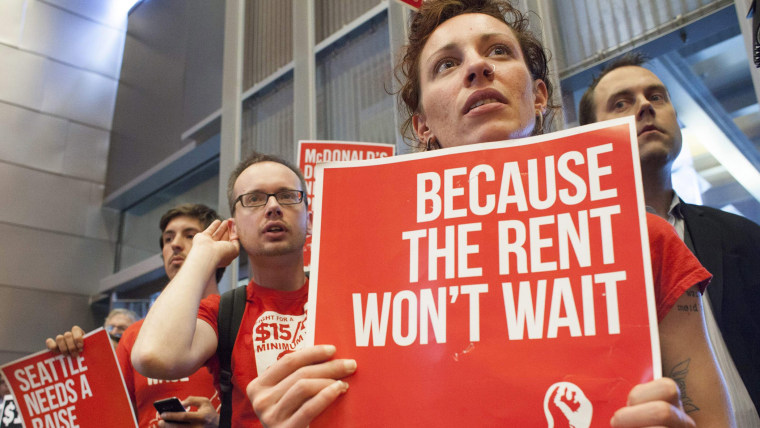The debate over raising the minimum wage is generally pretty straightforward: proponents, mainly on the left, argue that raising the minimum would help alleviate poverty and boost buying power, which in turn helps the broader economy. Opponents, mainly on the right, argue that higher wages discourages hiring and stunts growth.
It's led to a spirited dispute, but the resolution of the argument can be nearly as straightforward if we consider
the evidence.
New data show that the 13 states that raised the minimum wage this year are adding jobs at a faster pace than those that did not. State-by-state hiring data released Friday by the Labor Department reveal that in the 13 states that boosted minimum wages at the beginning of this year, the number of jobs grew an average of 0.85 percent from January to June. The average in the other 37 states was 0.61 percent, the Associated Press reports.
President Obama and congressional Democrats have fought consistently for a higher minimum wage, but have been unable to overcome opposition from congressional Republicans. But as we've
discussed many times, GOP-imposed gridlock on Capitol Hill hasn't meant an end to the debate; it's simply shifted the debate to state capitols.
With this in mind, a variety of states, mostly under Democratic control, have approved wage increases, well beyond the floor set by federal law. In each instance, there were critics on the right in those states insisting that if their state passed a higher minimum wage, it would put their state at a competitive disadvantage. The result, conservatives argued, would mean weaker local economies.
Except, now we know they were wrong. States that raised their minimum wage have added more jobs than states that didn't.
In fairness, it's important to note the correlation/causation issue -- it's tough to argue definitively that these blue states are outperforming red states because of their higher minimum wage. That said, the evidence is an
important addition to the debate.
Economists who support a higher minimum say the figures are encouraging, though they acknowledge they don't establish a cause and effect. There are many possible reasons hiring might accelerate in a particular state. "It raises serious questions about the claims that a raise in the minimum wage is a jobs disaster," said John Schmitt, a senior economist at the liberal Center for Economic and Policy Research. The job data "isn't definitive," he added, but is "probably a reasonable first cut at what's going on."
Put it this way: if the results were flipped, and hiring was worse in higher-minimum-wage states, do you suppose Republicans would be using this as evidence to bolster their opposition against the idea?
